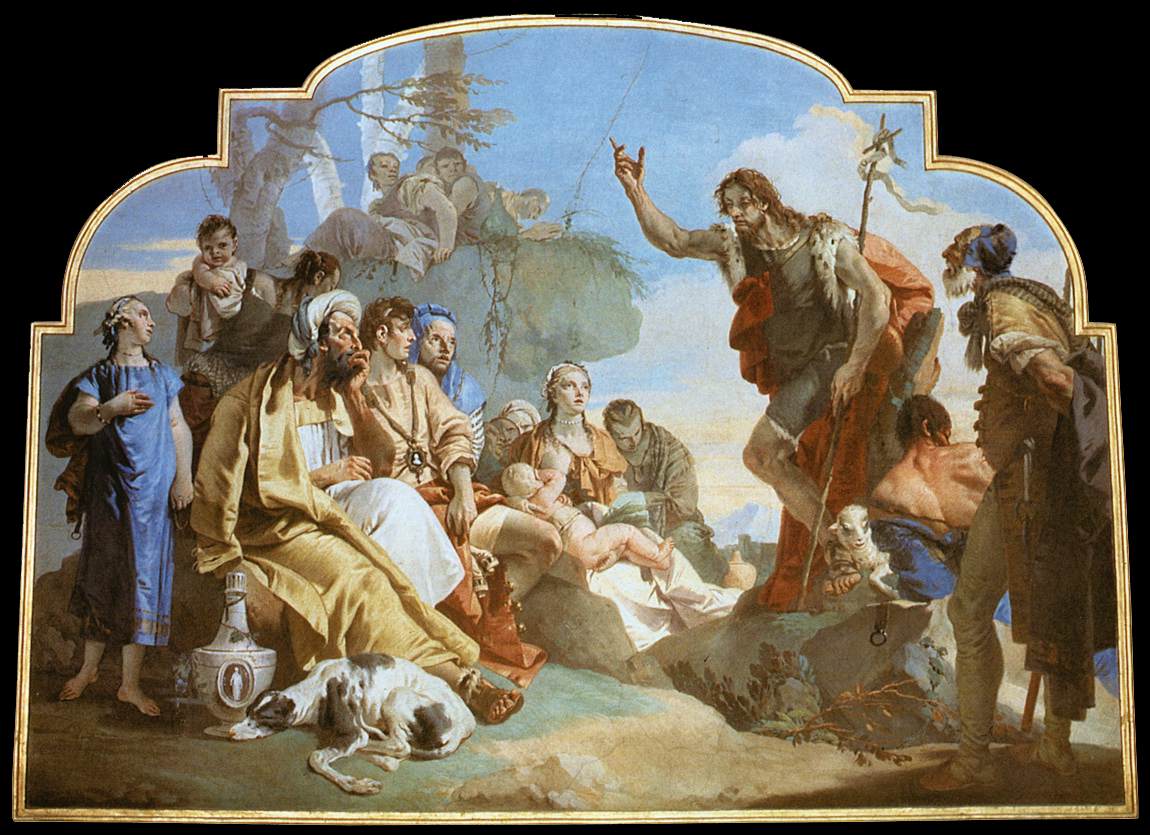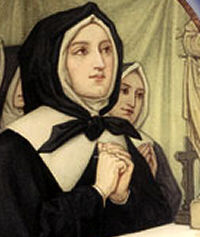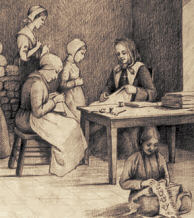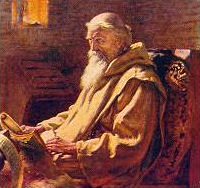22. After these things came Jesus and his disciples into the land of Judea; and there he tarried with them, and baptized.
23. And John also was baptizing in Ænon near to Salim, because there was much water there: and they came, and were baptized.
24. For John was not yet cast into prison.
25. Then there arose a question between some of John's disciples and the Jews about purifying.
26. And they came to John, and said to him, Rabbi, he that was with you beyond Jordan, to whom you bare witness, behold, the same baptizes, and all men come to him.
CHRYS. Nothing is more open than truth, nothing bolder; it neither seeks concealment, or avoids danger, or fears the snare, or cares for popularity. It is subject to no human weakness. Our Lord went up to Jerusalem at the feasts, not from ostentation or love of honor, but to teach the people His doctrines, and show miracles of mercy. After the festival He visited the crowds who were collected at the Jordan. After these things came Jesus and His disciples into the land of Judea; and there he tarried with them, and baptized.
BEDE; After these things, is not immediately after His dispute with Nicodemus, which took place at Jerusalem; but on His return to Jerusalem after some time spent in Galilee.
ALCUIN. By Judea are meant those who confess, whom Christ visits; for wherever there is confession of sins, or the praise of God, thither comes Christ and His disciples, i. e. His doctrine and enlightenment; and there He is known by His cleansing men from sin: And there He tarried with them, and baptized.
CHRYS. As the Evangelist says afterwards, that Jesus baptized not but His disciples, it is evident that he means the same here, i.e. that the disciples only baptized.
AUG. Our Lord did not baptize with the baptism wherewith He had been baptized; for He was baptized by a servant, as a lesson of humility to us, and in order to bring us to the Lord's baptism, i.e. His own; for Jesus baptized, as the Lord, the Son of God.
BEDE; John still continues baptizing, though Christ has begun; for the shadow remains still, nor must the forerunner cease, till the truth is manifested. And John also was baptizing in Ænon, near to Salim. Ænon is Hebrew for water; so that the Evangelist gives, as it were, the derivation of the name, when he adds, For there was much water there. Salim is a town on the Jordan, where Melchisedec once reigned.
JEROME; It matters not whether it is called Salem, or Salim; since the Jews very rarely use vowels in the middle of words; and the same words are pronounced with different vowels and accents, by different readers, and in different places.
And they came, and were baptized. BEDE; The same kind of benefit which catechumens receive from instruction before they are baptized, the same did John's baptism convey before Christ's. As John preached repentance, announced Christ's baptism, and drew all men to the knowledge of the truth now made manifest to the world: so the ministers of the Church first instruct those who come to the faith, then reprove their sins; and lastly, drawing them to the knowledge and love of the truth, offer them remission by Christ's baptism.
CHRYS. Notwithstanding the disciples of Jesus baptized, John did not leave off till his imprisonment; as the Evangelist's language intimates, For John was not yet cast into prison.
BEDE; He evidently here is relating what Christ did before John's imprisonment; a part which has been passed over by the rest, who commence after John's imprisonment.
AUG. But why did John baptize?
AUG. Because it was necessary that our Lord should be baptized.
And why was it necessary that our Lord should be baptized? That no one might ever think himself at liberty to despise baptism.
CHRYS, But why did he go on baptizing now? Because, had he left off, it might have been attributed to envy or anger: whereas, continuing to baptize, he got no glory for himself, but sent hearers to Christ. And he was better able to do this service, than were Christ's own disciples; his testimony being so free from suspicion, and his reputation with the people so much higher than theirs. He therefore continued to baptize, that he might not increase the envy felt by his disciples against our Lord's baptism. Indeed, the reason, I think, why John's death was permitted, and, in his room, Christ made the great preacher, was, that the people might transfer their affections wholly to Christ, and no longer be divided between the two. For the disciples of John did become so envious of Christ's disciples, and even of Christ Himself, that when they saw the latter baptizing, they threw contempt upon their baptism, as being inferior to that of John's; And there arose a question from some of John's disciples with the Jews about purifying. That it was they who began the dispute, and not the Jews, the Evangelist implies by saying, that there arose a question from John's disciples, whereas he might have said, The Jews put forth a question.
AUG. The Jews then asserted Christ to be the greater person, and His baptism necessary to be received. But John's disciples did not understand so much, and defended John's baptism. At last they come to John, to solve the question: And they came unto John, and said to him, Rabbi, He that was with you beyond Jordan, behold, the Same baptizes.
CHRYS. Meaning, He, Whom you baptized, baptizes. They did not say expressly, Whom you baptized, for they did not wish to be reminded of the voice from heaven, but, He Who was with you, i.e. Who was in the situation of a disciple, who was nothing more than any of us, He now separates Himself from you, and baptizes. They add, To Whom you bare witness; as if to say, Whom you showed to the world, Whom you made renowned, He now dares to do as you do. Behold, the Same baptizes. And in addition to this, they urge the probability that John's doctrines would fall into discredit. All men come to Him.
ALCUIN. Meaning, Passing by you, all men run to the baptism of Him Whom you baptized.
27. John answered and said, A man can receive nothing, except it be given him from heaven.
28. You yourselves bear me witness, that I said, I am not the Christ, but that I am sent before him.
29. He that has the bride is the bridegroom; but the friend of the bridegroom, which stands and hears him, rejoices greatly because of the bridegroom's voice: this my joy therefore is fulfilled.
30. He must increase, but I must decrease.
CHRYS. John, on this question being raised, does not rebuke his disciples, for fear they might separate, and turn to some other school, but replies gently, John answered and said, A man can receive nothing, except it be given him from heaven; as if he said, No wonder that Christ does such excellent works, and that all men come to Him; when He Who does it all is God. Human efforts are easily seen through, are feeble, and short-lived. These are not such: they are not therefore of human, but of divine originating. He seems however to speak somewhat humbly of Christ, which will not surprise us, when we consider that it was not fitting to tell the whole truth, to minds prepossessed with such a passion as envy. He only tries for the present to alarm them, by showing that they are attempting impossible things, and fighting against God.
AUG. Or perhaps John is speaking here of himself: I am a mere man, and have received all from heaven, and therefore think not that, because it has been given me to be somewhat, I am so foolish as to spear: against the truth.
CHRYS. And see; the very argument by which they thought to have overthrown Christ, To whom you bare witness, he turns against them; You yourselves bear me witness, that I said, I am not the Christ; as if he said, If you think my witness true, you must acknowledge Him more worthy of honor shall myself. He adds, But that I was sent before Him; that is to say, I am a servant, and perform the commission of the Father which sent me; my witness is not from favor or partiality; I say that which was given me to say.
BEDE; Who are you then, since you are not the Christ, and who is He to Whom you bear witness? John replies, He is the Bridegroom; I am the friend of the Bridegroom, sent to prepare the Bride for His approach: He that has the Bride, is the Bridegroom. By the Bride he means the Church, gathered from amongst all nations; a Virgin in purity of heart, in perfection of love, in the bond of peace, in chastity of mind and body; in the unity of the Catholic faith; for in vain is she a virgin in body, who continues not a virgin in mind. This Bride has Christ joined to Himself in marriage, and redeemed with the price of His own Blood.
THEOPHYL. Christ is the spouse of every soul; the wedlock, wherein they are joined, is baptism; the place of that wedlock is the Church; the pledge of it, remission of sins, and the fellowship of the Holy Ghost; the consummation, eternal life; which those who are worthy shall receive. Christ alone is the Bridegroom: all other teachers are but the friends of the Bridegroom, as was the forerunner. The Lord is the giver of good; the rest are the despisers of His gifts.
BEDE; His Bride therefore our Lord committed to His friend, i.e. the order of preachers, who should be jealous of her, not for themselves, but for Christ; The friend of the Bridegroom which stands and hears Him, rejoices greatly because of the Bridegroom's voice.
AUG. As if He said, She is not My spouse. But do you therefore not rejoice in the marriage? Yes, I rejoice, he said, because I am the friend of the Bridegroom.
CHRYS. But how does he who said above, Whose shoe's latchet I am not worthy to unloose, call himself a friend? As an expression not of equality, but of excess of joy: (for the friend of the Bridegroom is always more rejoiced than the servant,) and also, as a condescension to the weakness of his disciples, who thought that he was pained at Christ's ascendancy. For he hereby assures them, that so far from being pained, he was right glad that the Bride recognized her Spouse.
AUG. But wherefore does he stand? Because he fails not, by reason of his humility. A sure ground this to stand upon, Whose shoe's latchet I am not worthy to unloose. Again; He stands, and hears Him. So then if he fails, he hears Him not. Therefore the friend of the Bridegroom ought to stand and hear, i.e. to abide in the grace which he has received, and to hear the voice in which he rejoices. I rejoice not, he said, because of my own voice, but because of the Bridegroom's voice. I rejoice; I in hearing, He in speaking; I am the ear, He the Word. For he who guards the bride or wife of his friend, takes care that she love none else; if he wish to be loved himself in the stead of his friend, and to enjoy her who was entrusted to him, how detestable does he appear to the whole world? Yet many are the adulterers I see, who would fain possess themselves of the spouse who was bought at so great a price, and who aim by their words at being loved themselves instead of the Bridegroom.
CHRYS. Or thus; The expression, which stands, is not without meaning, but indicates that his part is now over, and that for the future he must stand and listen. This is a transition from the parable to the real subject. For having introduced the figure of a bride and bridegroom, he shows how the marriage is consummated; viz. by word and doctrine. Faith cometh by hearing, and hearing by the word of God. And since the things he had hoped for had come to pass, he adds, This my Joy therefore is fulfilled; i.e. The work which I had to do is finished, and nothing more is left, that I can do.
THEOPHYL. For which cause I rejoice now, that all men follow Him. For had the bride, i.e. the people, not come forth to meet the Bridegroom, then I, as the friend of the Bridegroom, should have grieved.
AUG. Or thus; This my joy is fulfilled, i.e. my joy at hearing the Bridegroom's voice. I have my gift; I claim no more, lest I lose that which I have received. He who would rejoice in himself, has sorrow; but he who would rejoice in the Lord, shall ever rejoice, because God is everlasting.
BEDE; He rejoices at hearing the Bridegroom's voice, who knows that he should not rejoice in his own wisdom, but in the wisdom which God gives him. Whoever in his good works seeks not his own glory, or praise, or earthly gain, but has his affections set on heavenly things; this man is the friend of the Bridegroom.
CHRYS. He next dismisses the motions of envy, not only as regards the present, but also the future, saying, He must increase, but I must decrease: as if he said, My office has ceased, and is ended; but His advances.
AUG. What means this, He must increase? God neither increases, nor decreases. And John and Jesus, according to the flesh, were of the same age: for the six months' difference between them is of no consequence. This is a great mystery. Before our Lord came, men gloried in themselves; He came in no man's nature, that the glory of man might be diminished, and the glory of God exalted. For He came to remit sins upon man's confession: a man's confession, a man's humility, is God's pity, God's exaltation. This truth Christ and John proved, even by their modes of suffering: John was beheaded, Christ was lifted up on the cross. Then Christ was born, when the days begin to lengthen; John, when they begin to shorten. Let God's glory then increase in us, and our own decrease, that ours also may increase in God. But it is because you understand God more and more, that He seems to increase in you: for in His own nature He increases not, but is ever perfect: even as to a man cured of blindness, who begins to see a little, and daily sees more, the light seems to increase, whereas it is in reality always at the fall, whether he sees it or not. In like manner the inner man makes advancement in God, and it seems as if God were increasing in Him; but it is He Himself that decreases, falling from the height of His own glory, and rising in the glory of God.
THEOPHYL. Or thus; As, on the sun rising, the light of the other heavenly bodies seems to be extinguished, though in reality it is only obscured by the greater light: thus the forerunner is said to decrease; as if he were a star hidden by the sun. Christ increases in proportion as he gradually discloses Himself by miracles; not in the sense of increase, or advancement in virtue, (the opinion of Nestorius,) but only as regards the manifestation of His divinity.
Catena Aurea John 3



 Beyond the classroom, she worked with families, assisted in faith formation in the parish, and addressed the social service needs of the colonists. Noteworthy among her contributions to the colony is the special vocational schools she established to provide the domestic skills a young woman would need to run a home in the wilderness.
Beyond the classroom, she worked with families, assisted in faith formation in the parish, and addressed the social service needs of the colonists. Noteworthy among her contributions to the colony is the special vocational schools she established to provide the domestic skills a young woman would need to run a home in the wilderness.  Born in c.628 to one of Northumbria's noble families, Biscop Baducing—Benedict's original name—initially served as a thane of the local king, Oswiu. In 653 he left this service and gave up his estate to persue an interest in the church, travelling to Rome's holy sites. Northern England's Christianity derived from Irish sources and the style of church Benedict found in Rome—which formed Europe's mainstream—was quite different but evidently to his liking, because he pledged himself to it.
Born in c.628 to one of Northumbria's noble families, Biscop Baducing—Benedict's original name—initially served as a thane of the local king, Oswiu. In 653 he left this service and gave up his estate to persue an interest in the church, travelling to Rome's holy sites. Northern England's Christianity derived from Irish sources and the style of church Benedict found in Rome—which formed Europe's mainstream—was quite different but evidently to his liking, because he pledged himself to it.